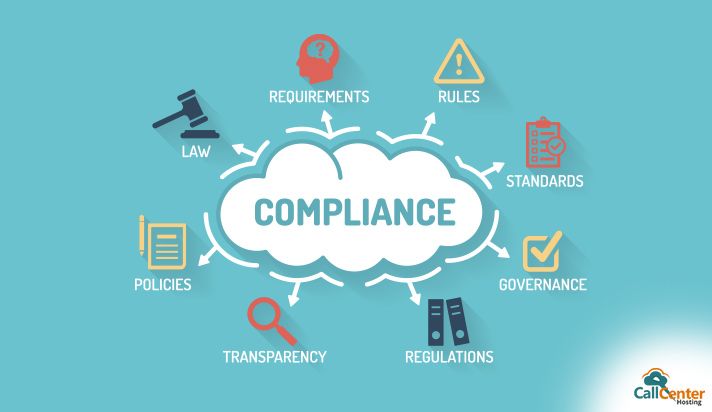If you are a business that uses phone calls to communicate with your customers, prospects, partners, or suppliers, you need to be aware of the call compliance regulations that apply to your industry. These are the rules and laws that govern how you can make, receive, record, monitor, or analyze phone calls for various purposes, such as marketing, sales, customer service, research, or quality assurance.
Call compliance regulations are important for your business because they can:
- Protect the privacy and rights of your phone contacts.
- Prevent unwanted and intrusive calls that may annoy or harm your phone contacts.
- Avoid lawsuits, fines, penalties, injunctions, or reputational damage that may result from violating the regulations.
- Enhance the trust and credibility of your business among your phone contacts.
- Improve the efficiency and effectiveness of your phone campaigns.
However, call compliance regulations are not always easy or straightforward to follow. There are many different regulations that may apply to your industry, depending on the type of phone call, the location of the caller and the recipient, the consent of the recipient, and the content of the call. Some of the most common and important call compliance regulations are:
- TCPA (Telephone Consumer Protection Act): This is a federal law that regulates telemarketing and unsolicited communications by phone, text, or fax. It requires you to obtain prior express consent from the recipient before making any automated or prerecorded calls or messages. It also requires you to honor do-not-call requests, provide opt-out options, and limit the time and frequency of calls or texts.
- TSR (Telemarketing Sales Rule): This is a federal rule that regulates telemarketing sales calls by phone. It requires you to identify yourself and your purpose at the beginning of the call. It also prohibits you from making false or misleading claims, using abusive or deceptive tactics, or charging fees before delivering goods or services.
- FDCPA (Fair Debt Collection Practices Act): This is a federal law that regulates debt collection calls by phone. It prohibits you from harassing, threatening, or abusing the debtor or any third party. It also prohibits you from calling at inconvenient times or places, disclosing personal information to others, or using false or misleading information to collect a debt.
- HIPAA (Health Insurance Portability and Accountability Act): This is a federal law that regulates health information calls by phone. It requires you to protect the privacy and security of the health information of your phone contacts. It also requires you to obtain authorization from the phone contact before using or disclosing their health information for any purpose other than treatment, payment, or health care operations.
- PCI DSS (Payment Card Industry Data Security Standard): This is a global standard that regulates payment card information calls by phone. It requires you to protect the confidentiality and integrity of the payment card information of your phone contacts. It also requires you to encrypt, mask, or delete any payment card information that is stored, processed, or transmitted by phone.
These are just some of the examples of call compliance regulations that may apply to your industry. You need to research and understand the specific regulations that apply to your industry and follow them accordingly.
In this article, we will explain what call compliance regulations are and why they are important for your business. We will also provide some tips and best practices on how to comply with call compliance regulations for your industry.
What are Call Compliance Regulations and Why are They Important for Your Business?
Call compliance regulations are the rules and laws that govern how you can make, receive, record, monitor, or analyze phone calls for various purposes, such as marketing, sales, customer service, research, or quality assurance.
Call compliance regulations are important for your business because they can:
- Protect the privacy and rights of your phone contacts. Call compliance regulations aim to protect the privacy and rights of your phone contacts by preventing unwanted and intrusive calls that may violate their consent, preferences, or expectations. By following call compliance regulations, you can respect the privacy and rights of your phone contacts and avoid causing them annoyance or harm.
- Prevent lawsuits, fines, penalties, injunctions, or reputational damage. Call compliance regulations also aim to prevent lawsuits, fines, penalties, injunctions, or reputational damage that may result from violating the rules and laws of phone communications. By following call compliance regulations, you can avoid legal troubles and costs that may arise from breaking the law or facing complaints from your phone contacts.
- Enhance the trust and credibility of your business among your phone contacts. Call compliance regulations also aim to enhance the trust and credibility of your business among your phone contacts by ensuring that you provide a positive and professional phone experience. By following call compliance regulations, you can demonstrate that you are a legitimate and ethical business that cares about your phone contacts and their needs.
- Improve the efficiency and effectiveness of your phone campaigns. Call compliance regulations also aim to improve the efficiency and effectiveness of your phone campaigns by ensuring that you use the best practices and strategies of phone communications. By following call compliance regulations, you can optimize your phone campaigns by reaching the right people at the right time with the right message.
What are Some of the Common and Important Call Compliance Regulations for Your Industry?
There are many different call compliance regulations that may apply to your industry, depending on the type of phone call, the location of the caller and the recipient, the consent of the recipient, and the content of the call. Some of the most common and important call compliance regulations are:
- TCPA (Telephone Consumer Protection Act): This is a federal law that regulates telemarketing and unsolicited communications by phone, text, or fax. It requires you to obtain prior express consent from the recipient before making any automated or prerecorded calls or messages. It also requires you to honor do-not-call requests, provide opt-out options, and limit the time and frequency of calls or texts.
- TSR (Telemarketing Sales Rule): This is a federal rule that regulates telemarketing sales calls by phone. It requires you to identify yourself and your purpose at the beginning of the call. It also prohibits you from making false or misleading claims, using abusive or deceptive tactics, or charging fees before delivering goods or services.
- FDCPA (Fair Debt Collection Practices Act): This is a federal law that regulates debt collection calls by phone. It prohibits you from harassing, threatening, or abusing the debtor or any third party. It also prohibits you from calling at inconvenient times or places, disclosing personal information to others, or using false or misleading information to collect a debt.
- HIPAA (Health Insurance Portability and Accountability Act): This is a federal law that regulates health information calls by phone. It requires you to protect the privacy and security of the health information of your phone contacts. It also requires you to obtain authorization from the phone contact before using or disclosing their health information for any purpose other than treatment, payment, or health care operations.
- PCI DSS (Payment Card Industry Data Security Standard): This is a global standard that regulates payment card information calls by phone. It requires you to protect the confidentiality and integrity of the payment card information of your phone contacts. It also requires you to encrypt, mask, or delete any payment card information that is stored, processed, or transmitted by phone.
These are just some of the examples of call compliance regulations that may apply to your industry. You need to research and understand the specific regulations that apply to your industry and follow them accordingly.
How to Comply with Call Compliance Regulations for Your Industry?
Complying with call compliance regulations for your industry is not always easy or straightforward. There are many challenges and complexities that you may face when trying to comply with call compliance regulations for your industry. Some of these challenges and complexities are:
- The diversity and variability of call compliance regulations across different jurisdictions, industries, and purposes.
- The ambiguity and uncertainty of some call compliance regulations that may leave room for interpretation or discretion.
- The dynamism and evolution of call compliance regulations that may change over time due to new laws, rules, cases, or technologies.
- The enforcement and monitoring of call compliance regulations that may vary in frequency, intensity, or severity.
To overcome these challenges and complexities and comply with call compliance regulations for your industry, you need to follow some tips and best practices, such as:
- Educate yourself and your staff on the call compliance regulations that apply to your industry and keep yourself updated on any changes or developments.
- Obtain and document the consent of your phone contacts before making any calls or messages and honor their do-not-call requests and opt-out options.
- Identify yourself and your purpose at the beginning of each call and provide accurate and truthful information throughout the call.
- Respect the privacy and rights of your phone contacts and protect their personal, financial, or health information from unauthorized use or disclosure.
- Use a reliable and secure phone system or dialer that can help you comply with call compliance regulations and prevent any violations or errors.
- Monitor and measure your phone campaigns and their compliance with call compliance regulations and make any adjustments or improvements as needed.
Call compliance regulations are the rules and laws that govern how you can make, receive, record, monitor, or analyze phone calls for various purposes, such as marketing, sales, customer service, research, or quality assurance.
Call compliance regulations are important for your business because they can protect the privacy and rights of your phone contacts, prevent lawsuits, fines, penalties, injunctions, or reputational damage, enhance the trust and credibility of your business among your phone contacts, and improve the efficiency and effectiveness of your phone campaigns.
However, call compliance regulations are not always easy or straightforward to follow. There are many different regulations that may apply to your industry, depending on the type of phone call, the location of the caller and the recipient, the consent of the recipient, and the content of the call. You need to research and understand the specific regulations that apply to your industry and follow them accordingly.
To comply with call compliance regulations for your industry, you need to follow some tips and best practices, such as educating yourself and your staff on the regulations, obtaining and documenting the consent of your phone contacts, identifying yourself and your purpose at the beginning of each call, respecting the privacy and rights of your phone contacts, using a reliable and secure phone system or dialer, and monitoring and measuring your phone campaigns.
If you are a business that uses phone calls to communicate with your customers, prospects, partners, or suppliers, you need to comply with call compliance regulations for your industry today.



